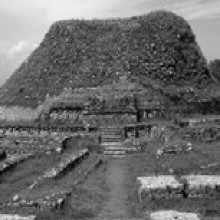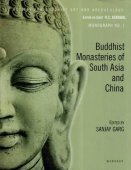Taxila: 2 definitions
Introduction:
Taxila means something in Hinduism, Sanskrit, the history of ancient India. If you want to know the exact meaning, history, etymology or English translation of this term then check out the descriptions on this page. Add your comment or reference to a book if you want to contribute to this summary article.
Images (photo gallery)
In Hinduism
Dharmashastra (religious law)
Source: Knowledge Traditions & Practices of India: Education: Systems & PracticesTaxila or Takshashila (c. 600 BCE–500 CE) near Rawalpindi in present-day Pakistan, was among the world’s first universities. Taxila University’s different Schools taught many subjects. Medicine was given special attention; there were also schools of painting, sculpture, image-making, handicrafts and astronomy. Tradition has it that the legendary Indian grammarian Pāṇini (7th-6th cent BCE) was a student there, as was Cāṇakya (c. 3rd cent BCE) the well-known exponent of statecraft. Jīvaka (5th BCE) one of the most renowned physicians in ancient India, is also said to have learnt medicine at Taxila.

Dharmashastra (धर्मशास्त्र, dharmaśāstra) contains the instructions (shastra) regarding religious conduct of livelihood (dharma), ceremonies, jurisprudence (study of law) and more. It is categorized as smriti, an important and authoritative selection of books dealing with the Hindu lifestyle.
India history and geography
Source: Shodhganga: New look on the kushan bengaliThe ancient site of Taxila was identified by Cunningham with the mounds of Shahdheri, nearly one mile north-east of Kals-kal Sarai, in the district in Rawalpindi. It was situated at a distance of nearly 20 miles, north west of the modem city of Rawalpindi (Cunningham, 1871).

The history of India traces the identification of countries, villages, towns and other regions of India, as well as mythology, zoology, royal dynasties, rulers, tribes, local festivities and traditions and regional languages. Ancient India enjoyed religious freedom and encourages the path of Dharma, a concept common to Buddhism, Hinduism, and Jainism.
See also (Relevant definitions)
Full-text (+1): Takshashila, Bhadrashila, Valabhi, Cukhsa, Vikramashila, Gandhara, Uttarapathaka, Atreya, Bhir, Punjab, Apollonius, Pushkarasarin, Benares, Ganges, Thomas, Takkasila, Nalanda, Shvasa, Shaivism, Parikshit.
Relevant text
Search found 39 books and stories containing Taxila; (plurals include: Taxilas). You can also click to the full overview containing English textual excerpts. Below are direct links for the most relevant articles:
Taxila < [May 1939]
Taxila - A Study Centre and University < [April – June, 1997]
The Medicine Man: A Forerunner < [April – June, 2000]
Stupas in Orissa (Study) (by Meenakshi Chauley)
Dharmarajika Stupa < [Chapter 3]
Symbolism of the Stupa < [Chapter 3]
Stupa at Nagarjunakonda < [Chapter 3]
Dhammapada (Illustrated) (by Ven. Weagoda Sarada Maha Thero)
Verse 43 - The Story of Soreyya < [Chapter 3 - Citta Vagga (Mind)]
Verse 422 - The Story of Angulimāla the Fearless < [Chapter 26 - Brāhmaṇa Vagga (The Brāhmaṇa)]
Settlement in Early Historic Ganga Plain (by Chirantani Das)
Part 8 - Trade network of the Vārāṇasī region < [Chapter VI - Vārāṇasī: Emergence of the Urban Centre and Seat of Administration]
Part 5 - Glass industry of the Vārāṇasī region < [Chapter VI - Vārāṇasī: Emergence of the Urban Centre and Seat of Administration]
Part 7 - Ceramics and Pottery of the Vārāṇasī region < [Chapter VI - Vārāṇasī: Emergence of the Urban Centre and Seat of Administration]
History of Indian Medicine (and Ayurveda) (by Shree Gulabkunverba Ayurvedic Society)
Chapter 11 - Institutions and Universities < [Part 2-3 - Medical Institutions in Ancient India]
Chapter 13 - Completion of Study < [Part 2-3 - Medical Institutions in Ancient India]
Chapter 15 - Kampilya as a Centre of Learning < [Part 4 - Some Aspects of Life in Caraka’s Times]
A Record of Buddhistic Kingdoms (by Fa-Hien)
Related products



